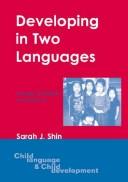| Listing 1 - 1 of 1 |
Sort by
|

ISBN: 1280828404 9781853597481 9786610828401 1853597481 9781853597480 1853597473 9781853597473 1853597465 9781853597466 9781280828409 6610828407 Year: 2004 Publisher: Clevedon Channel View Publications
Abstract | Keywords | Export | Availability | Bookmark
 Loading...
Loading...Choose an application
- Reference Manager
- EndNote
- RefWorks (Direct export to RefWorks)
Immigrant parents are frequently advised by teachers, doctors and speech therapists to stop speaking the native language at home so as not to confuse children with input from two languages. However, this view is not supported by empirical linguistic and social evidence. This book sheds light on some of the common myths around being bilingual and explores the processes of dual language development among Korean children growing up in the United States. The book sensibly argues that the bilingualism of linguistic minority children is a resource to be cultivated, not a problem to be overcome. In addition, it explores various educational, social and economic pressures which hamper intergenerational transmission of heritage languages, and discusses factors that contribute to successful bilingual raising of children in spite of these pressures. A welcome addition to the growing literature on bilingual development, this book offers useful suggestions for parents, teachers and policy makers who are interested in promoting the development and maintenance of bilingual competence in linguistic minority children.
Bilingualism in children --- Korean American children --- Children, Korean American --- Children --- Language. --- Bilingual competence . --- Bilingual development. --- Bilingualism. --- Child language development. --- Dual language development . --- English. --- Heritage languages. --- Korean. --- Linguistic minority.
| Listing 1 - 1 of 1 |
Sort by
|

 Search
Search Feedback
Feedback About UniCat
About UniCat  Help
Help News
News